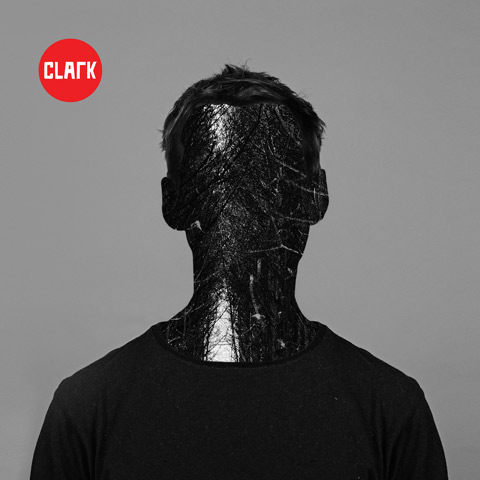Chris Clark cuts a strange figure; signed to Warp Records at the tail-end of their late 90s IDM heyday, he’s subsequently carved out a niche for himself in successful but unassuming fashion. His seven albums to date have all been ambitious, meticulously crafted and popular, but he never seems to have been celebrated quite as widely or fervently as Warp’s other long-standing grandees.
This is possibly something of an injustice. It’s no hyperbole to say that Clark’s 2006 LP Body Riddle is one of electronic music’s unheralded masterpieces, its layers of heat-warped melodies, flickering textures and muscular drumming (played by Clark himself) creating a beautiful and unstable mixture of violence and wistfulness. Its production is immaculate, almost inhumanly so, swaddling the listener in midrange before pummelling them viciously, shifting seamlessly between organic instruments and impossible, vertiginous sound design.
The three albums released between Body Riddle and Clark have each separated out a different strand from that complex mesh. Turning Dragon was Clark’s take on industrial techno: an uncompromising and monochrome piece, its brute force was easy to admire but hard to truly love.
Totems Flare was a friendlier proposition, albeit still glitchy and oblique, as if Bruce Haack’s electronic symphonies had been given a 21st-century sheen. 2012’s Iradelphic was more overtly nostalgic, its warbling synths and cosy acoustic guitars sailing closer (occasionally too close) to labelmates Boards Of Canada, tipping over into whimsy at points, and yet also including the phenomenal three-part ‘The Pining’.
So perhaps it’s ironic that Clark, arguably the producer’s finest work in years and a hugely impressive album on its own terms, falls so neatly into the shadow cast by the recent release of Aphex Twin’s similarly excellent Syro. With the inevitable end-of-year lists fast approaching, and limited airtime available in the section marked "2014 comeback albums from long-time IDM survivors signed to Warp", it’s easy to fear that Clark may fail to get the attention it deserves. This would be a colossal shame, though. Throughout its 47 minutes, Clark captures much of the depth, adventurousness and unpredictability which made Body Riddle so special, draws together the best aspects of his more recent albums, and supplies numerous newer pleasures of its own.
After the brief intro ‘Ship Is Flooding’, all foggy ambience and portentous cello tones, first track proper "Winter Linn" initially feels like a misstep. Its plodding rhythm is uncomfortable and laboured, its piano and synth motifs frustratingly tentative. But just when it feels like the whole thing is about to run out of energy, Clark hollows out the midrange, and suddenly creates space for some satisfyingly hefty boom-bap drums and twitchy electronics.
From that point onwards, the album finds its footing and proceeds in increasingly confident fashion. Particularly impressive is its central sequence of more dancefloor-friendly tracks: ‘Unfurla’ is a dreamy take on techno, with piano, xylophone and synths weaving a neat melody around increasingly insistent drums and textures, in similar fashion to Call Super’s recent Suzi Ecto LP, or Objekt’s ‘The Stitch Up’ 12".
‘Sodium Thinners’ starts off as a functional slab of dub techno, before evolving into something infinitely more spindly and unsettling. ‘Banjo’ is a fearsome electro banger, replete with comically over-sized bass implosions and squealing high frequencies, while ‘The Grit In The Pearl’ gradually decays into a stew of buzzing tones and amorphous clattering, like someone slowly releasing a swarm of hornets into a warehouse rave.
Quieter moments are carefully interspersed throughout: the terribly-titled ‘Strength Through Fragility’ sounds like the riff from a barely-remembered piano house track, dropped into a limpid pool of reverb and static. The vocal chop-ups and heavily synthetic drums on ‘Snowbird’ recall Holly Herndon or the new-wave grime of Visionist, but Clark veers away from those artists’ hyper-real modernity, introducing a glockenspiel instead: the effect is becalming, nostalgic, almost pastoral.
‘There’s A Distance In You’ (again with the awful track titles) combines these two approaches: bustling drums and acidic synth lines drop away to reveal a sombre and stately procession of bass woodwinds and strings (or their synthesised equivalents). The ambitious and unexpected combination of such different styles and emotional resonances serves as a neat encapsulation of the album as a whole (perhaps of Clark’s entire career), handled with a deftness of touch which stops it feeling forced or ostentatious.
Not everything on here is quite so successful (excising the leaden-sounding ‘Silvered Iris’ probably wouldn’t have done any harm), and some listeners might tire of how grandiose everything is: the shuddering drum hits, the intricate arrangements, those corny post-rock song titles. There’s a faint sense throughout of Clark’s eagerness to please, to show us all the cool new tricks at his disposal: such earnestness is not always universally popular, particularly amongst those tastemakers for whom IDM may already be a dangerously untrendy term. These red herrings should be ignored, though: Clark is an album of unsettling beauty and exceptional skill. It deserves all the praise it gets, and more besides.
<div class="fb-comments" data-href="http://thequietus.com/articles/16635-clark-clark-review” data-width="550">


